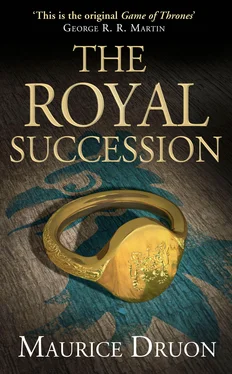Thus a sort of opposition party, which included the survivors among the great councillors of Philip the Fair, had formed about the Count of Poitiers. No one looked kindly on the ambitions of the Count of Valois or indeed wanted the Duke of Burgundy to meddle in the affairs of the Crown. They admired the speed with which the young Prince had acted and they placed their hopes in him.
Poitiers wrote to Eudes of Burgundy and to Charles of Valois, without mentioning their letters, indeed as if he had not received them, to inform them that he considered himself Regent by natural right, and that he would summon the Assembly of Peers to give him its sanction as soon as possible.
In the meantime he appointed commissaries to go to the principal cities of the kingdom and assume authority in his name. Thus that day saw the departure of several of his knights – who were later to become his ‘Knights Pursuivant’ 8– such as Regnault de Lor, Thomas de Marfontaine and Guillaume Courteheuse. He kept with him Anseau de Joinville, the son of the great Joinville, and Henry de Sully.
While the knell tolled from all the steeples, Philippe of Poitiers conferred for a long time with Gaucher de Châtillon. The Constable of France sat by right on every government assembly, the Chamber of Peers, the Grand Council and the Small Council. Philippe, therefore, asked Gaucher to go to Paris to represent him and oppose Charles of Valois’s usurpation until his own arrival; moreover, the Constable would make sure that all the troops in the capital, particularly the Corps of Crossbowmen, were under his control.
For the new Regent, at first to the surprise, but then to the approbation, of his councillors, had determined to remain temporarily in Lyons.
‘We cannot leave the tasks we have in hand,’ he had declared; ‘the most important thing for the kingdom is to have a Pope, and we shall be all the stronger when we have made him.’
He hurried on the signature of the contract of betrothal between his daughter and the Dauphiniet. At first sight this seemed to have no connection with the pontifical election, yet in Philippe’s mind they were linked. The alliance with the Dauphin of Viennois, who ruled over all the territories south of Lyons and controlled the road to Italy, was a move in his game. If the Cardinals took it into their heads to slip through his fingers, they would not be able to take refuge in that direction. Furthermore, the betrothal consolidated his position as Regent; the Dauphin would be in his camp and would have sound reasons for not abandoning him.
Because of mourning the contract was signed during the following days without festivities.
At the same time Philippe of Poitiers negotiated with the most powerful baron of the region, the Count de Forez, who was also a brother-in-law of the Dauphin, and held the right bank of the Rhône.
Jean de Forez had fought in the campaign in Flanders, had several times represented Philip the Fair at the Papal Court, and had done very good work in getting Lyons ceded to the Crown. The Count of Poitiers knew that as soon as he resumed his father’s policy he could count on him.
On the 16th of June the Count de Forez performed a highly spectacular gesture. He paid solemn homage to Philippe as the suzerain of all the suzerains of France, thus recognizing him as the holder of the royal authority.
The following day Count Bermond de la Voulte, whose fief of Pierregourde was in the seneschalship of Lyons, placed his hands between those of the Count of Poitiers and swore him a similar oath of loyalty.
Poitiers asked the Count de Forez to hold ready seven hundred men-at-arms in secret. The Cardinals would not now be able to escape from the town.
Nevertheless, there was still a long way to go before an election was achieved. Negotiations lagged. The Italians, feeling that the Regent was in haste to return to Paris, had hardened in their position. ‘He’ll tire first,’ they said. Little they cared for the tragic state of anarchy in which the affairs of the Church were foundering.
Philippe of Poitiers had several interviews with Cardinal Duèze, who seemed to him much the most intelligent member of the Conclave, at once the most lucid and the most imaginative expert in religious matters, and the most desirable administrator for Christendom in these difficult times.
‘Heresy is flourishing everywhere, Monseigneur,’ said the Cardinal in his cracked, disquieting voice. ‘And how could it be otherwise with the example we give? The Devil takes advantage of our discord to sow his tares. But it is above all in the diocese of Toulouse that they flourish the most vigorously. It is an old land of rebellion and nightmare! The next Pope should divide that too-extensive diocese, so difficult to govern, into five bishoprics, placed in firm hands.’
‘Which would create a number of new benefices,’ replied the Count of Poitiers, ‘from which, of course, the Treasury of France would receive the annates. You see no objection to that?’
‘None.’
The first year’s revenues from new ecclesiastical benefices were called ‘annates’, which the King had a right to collect. The absence of a Pope prevented appointments being made to these benefices, which was a considerable loss to the Treasury, without taking into account the near-impossibility of collecting the arrears of taxes from the Church, while the clergy took advantage of the situation to raise every kind of difficulty which could not be resolved so long as the throne of Saint Peter was vacant. And indeed, when Philippe and Duèze considered the future, one as Regent, the other as eventual Pontiff, finance was the first concern of both.
Owing to the feudal rebellions, the revolt of the Flemings, the insurrection of the nobles of Artois and the brilliant inspirations of Charles of Valois, the royal Treasury was not only empty, but indebted for several years to come.
The papal Treasury, after two years of errant Conclave, was in no better state; and if the Cardinals sold themselves dearly to the princes of this world, it was because many of them no longer had any means of subsistence other than bartering their votes.
‘Fines, Monseigneur, fines,’ Duèze counselled the young Regent. ‘Fine those who have misbehaved, and the richer they are, the more heavily. If someone should break the law who has a hundred livres , take twenty; if he has a thousand, take five hundred; and should he have a hundred thousand, take practically all that he has. You’ll find that this policy has three advantages: in the first place, the yield will be the greater; in the second, deprived of his power, the malefactor will no longer be able to abuse it; and, finally, the poor, of whom there are great numbers, will be on your side and place confidence in your justice.’
Philippe of Poitiers smiled.
‘What you so wisely suggest, Monseigneur, may be most suitable to royal justice which is a secular arm,’ he replied, ‘but in order to restore the finances of the Church, I do not see …’
‘Fines, fines,’ repeated Duèze. ‘Let us place a tax on sin; it will be an inexhaustible source of revenue. Man is sinful by nature, but more disposed to penitence of the heart than of the purse. He will regret his sins the more keenly, and be the more hesitant to relapse into error, if our absolutions are accompanied by a tax. Whoever wishes to reform must pay for the privilege.’
‘Is he joking?’ thought Poitiers, who, as he saw more of Duèze, was discovering the Cardinal in Curia’s liking for paradox and mystification.
‘And what sins do you propose taxing, Monseigneur?’ he asked, as if he were joining in the game.
‘In the first place those committed by the clergy. We must begin by reforming ourselves before we undertake to reform others. Our Holy Mother is too tolerant of shortcomings and abuses. Thus, neither holy orders nor priesthood may be given to men who are mutilated or deformed. And yet, the other day, I saw a certain Abbé Pierre, who is with Cardinal Caetani, with two thumbs on his left hand.’
Читать дальше












